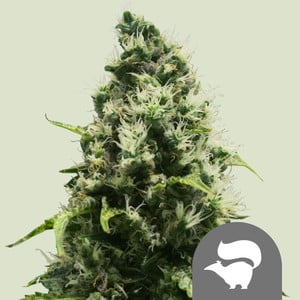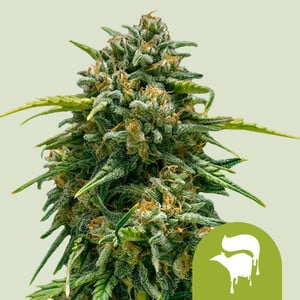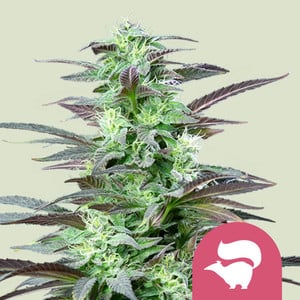Lemon Skunk
breed by GoldenseedHere you can find all info about Lemon Skunk from Goldenseed. If you are searching for information about Lemon Skunk from Goldenseed, check out our: Basic infos, Gallery, Degustation, Awards, Strain Reviews, Direct Comparisons, Lineage / Genealogy, Hybrids / Crossbreeds, User comments, for this cannabis variety here at this page and follow the links to get even more information. Or list all Lemon Skunk Strains (± 9) If you have any personal experiences with growing or consuming this cannabis variety, please use the upload links to add them to the database!
Basic infos
Lemon Skunk is an mostly sativa from Goldenseed and can be cultivated indoors and outdoors (Where the plants will need a flowering time of ±63 days) Goldenseed's Lemon Skunk also available as feminized seeds.
Goldenseed Description
Smooth citrus flavor, complex effect, well balanced and long-lasting. Ripe in 9 weeks, but an extra week will increase dramatically terpens content in the resin, resulting in a much richer flavor. Yield is high above average. Especially when you keep in mind that it's almost a pure sativa genetic. The skunk once again did a great job there! Old school Skunk, from the Amsterdam underground. This strain is a cross between two Skunks, the chosen phenotype selected for its lemon characteristics. The Lemon mother has been kept for over 20 years in Las Vegas and the father was chosen here in Holland. The male was donated by Eddie, formally the owner of one of the oldest and most prestigious seed banks in the Netherlands. This original prize male was selected and used in many breeding projects throughout the years. The Lemon Skunk will grow tall and is a good yielder. She has great smelling buds. Her buds are light green with thick orange hairs. She has a high calyx to leaf ratio. This strain is the tastiest and sweetest if she is cut down between 55 and 65 days. We would like to thank the Lemon Man and Eddie for making this possible! Very high THC 22% +
Genetics: Californian Lemon x Skunk#1
Variety: Sativa Dominant Hybrid
Effect: Uplifting high and rather special Lemon taste
Potency: 10 out of 10
Yield: 2/3 ounces
Stature: Average high
Phenotype: 70% Sativa : 30% Indica
Indoor: 55 to 65 days Outdoor: Mid October
Characteristics: Classic Lemon aroma
YIELD PER PLANT IS BASED ON 100% ORGANIC NUTRIENTS & SOIL IN 6 LITER CONTAINERS
Presoaking - Put some moist tissues on a plate. Put the seeds on top of them and then put a layer of moist tissues on the seeds. Cover the plate with another upturned plate, so that the seeds are in darkness and the environment remains moist. Put the covered seeds in a warm place (21°C). Check the seeds every day, sprinkle the tissues if necessary and carefully transplant the seeds when they open and the white tip of the root becomes visible. Put the seed in a growth medium (soil), approximately the size of the seed under the surface (about 5 mm).
Transplanting - do this as little as possible by germinating in the same container you intend to grow the plant in for a significant period of time. Many growers experience low germination rate if the temperatures are out of range. A heating pad set to low or medium may be necessary, or a shelf constantly warmed by a light may do, but test it with a few seeds first, before devoting your next crop to it. "No Light" is necessary. Cover the seeds with black paper to keep light out.
Plan on transplanting only once or twice before harvest. Use the biggest containers possible for the space and number of seedlings you plan to start. Plants will suffer if continuously transplanted and delay harvesting. You will suffer too, from too much work! Cut holes in the bottom of containers and fill the last few inches at the top with vermiculite only. Since vermiculite holds water well, wicks water well, but does not hold too much water, roots always have lots of oxygen.
If grown to full maturity, in the correct conditions, cannabis seeds will generally be dark grey or brown, or striped in colour, and measure between 3-5mm in length, and 2-4mm in diameter, depending on its origins. This beautifully patterned outer shell, the perianth, plays the vital role of protecting the delicate embryo inside, and should be of a good hard nature, without cracks or chipping. When choosing the right marijuana seeds to grow, the general rule is the bigger and darker they are the better. Different varieties of the plant produce different looking seeds. From the almost cannon-ball shape of classic Afghan seed, to the darker, more stream-lined look of some Sativa varieties, cannabis once again proves just how diverse she is! cannabis seeds
Cannabis is an annual plant, it's life-cycle completed within a year usually, dying just after setting it's seed for the next year. To keep seed over winter months store in a cool dark, air-tight place, that stays dry. Be careful not to crush the marijuana seeds. They may look tough, but damage can easily be caused this way.
Discarding the obviously damaged, the very small, or very lightly coloured specimens, is the first step in the right direction for any budding grower, as this type of natural selection mimics exactly what nature would do.(If you purchase your seeds from Goldenseed you wont need to throw any away because all our seeds are carefully screened for any defects, guaranteeing you get only the healthy viable ones to start with).
Before we launch into a description of how to test the seed, let's talk about seeds a bit. We have all planted seeds, but how much do you really know about them? Learning more about seeds can help improve your success with them.
Seed Parts When you look at a seed you are looking at the seed coat. As people wear coats for protection from foul weather, seed coats perform much the same function. They provide protection against entry of parasites, against mechanical injury and, in some seeds, against unfavorably high or low temperatures.
Inside the seed coat is the embryo, an immature plant with all the parts of the adult plant. A close look shows leaves and a root -- they may be tiny but they are the beginnings of a plant. The seed's embryo leaves are called the "cotyledons." The seed is filled with "endosperm," food that will nourish the embryo during its early stages of development.
Germinating Seeds Germination is a fascinating process. Seeing a tiny seedling emerge from a dry, wrinkled seed and watching its growth and transformation, is observing the mystery of life unfolding. The first sign of germination is the absorption of water -- lots of water. This activates an enzyme, respiration increases and plant cells are duplicated. Soon the embryo becomes too large, the seed coat bursts open and the growing plant emerges. The tip of the root is the first thing to emerge and it's first for good reason. It will anchor the seed in place, and allow the embryo to absorb water and nutrients from the surrounding soil.
Some seeds need special treatment or conditions of light, temperature, moisture, etc. to germinate. Seed dormancy is very complex, but it protects that living plant material until conditions are right for it to emerge and grow.
Practical lessons can be learned from the seed:
* Seeds with bigger amounts of endosperm can feed the embryo plant longer, while it works its way toward light. Therefore, big seeds can usually be planted deeper.
* Seeds must absorb water to get germination going. Therefore, presoaking seeds may speed up the process.
* Available water is important to the newly emerged root. Therefore, you should plant seeds a little deeper in the middle of summer, when the top of the soil dries out quickly.
Lemon Skunk Reviews
Lemon Skunk Degustation
Effect/Effectiveness
Smell / Aroma
Taste
Lemon Skunk Gallery
No images uploaded until now. Click here to upload imagesLemon Skunk Comparisons
How is Lemon Skunk growing and effecting compared to other varieties? 0 seedfinder users uploaded direct comparisons with Goldenseed' Lemon Skunk and compared this cannabis variety with 0 other strain(s).
Goldenseed Lemon Skunk:Lemon Skunk Lineage / Genealogy
-
Lemon Skunk
»»»
Unknown Skunk [Californian Lemon]
x
Skunk#1
- »»» Unknown Skunk [Californian Lemon] x Skunk#1
-
Unknown Skunk [Californian Lemon]
-
Skunk #1
- »»» (Afghanistan x Colombia) x Mexico
-
Afghanistan x Colombia
- Afghanistan »»» Indica
- Colombia »»» Sativa
- Mexico »»» Sativa
-
Skunk #1
- Skunk#1 (specified above)
Lemon Skunk Hybrids & Crossbreeds
We found 0 direct descendants from Goldenseed in the seedfinder strain database, here a short overview. To see all hybrids and their descendants, visit our Lemon Skunk Genealogy Page and check out all the direct crosses as like as the following generations.
Lemon Skunk User comments
Altogether we've collected 0 about Goldenseed.Unluckily not one of this comments is in en!
Upload your info about this strain here:
Do you know something more about Goldenseed? Please help to make this database better and upload/connect your information here!
Pictures
Pictures speak louder than words! Upload your "Lemon Skunk" Photos here and help other growers to get a better impression of this variety.Comparisons
Lemon Skunk VS. Strain direct comparisation formUser Reviews
Our strain reviews are multilingual, searchable and can be very detailed - including data about the grow, aroma, effects and taste! Please upload your Lemon Skunk Review here to help the other seedfinder users!
Medical Values
You have experience with the medical qualities of Lemon Skunk? Sharing your information here maybe can help other people!
Threads
You've stumbled upon a Lemon Skunk related thread into a forum or growers community? Connect it here and enable othe users to find this information fast and easy!
Videos
You found a related video with additional information or grow-infos about Lemon Skunk on YouTube? Please connect it here to the strain info page!



